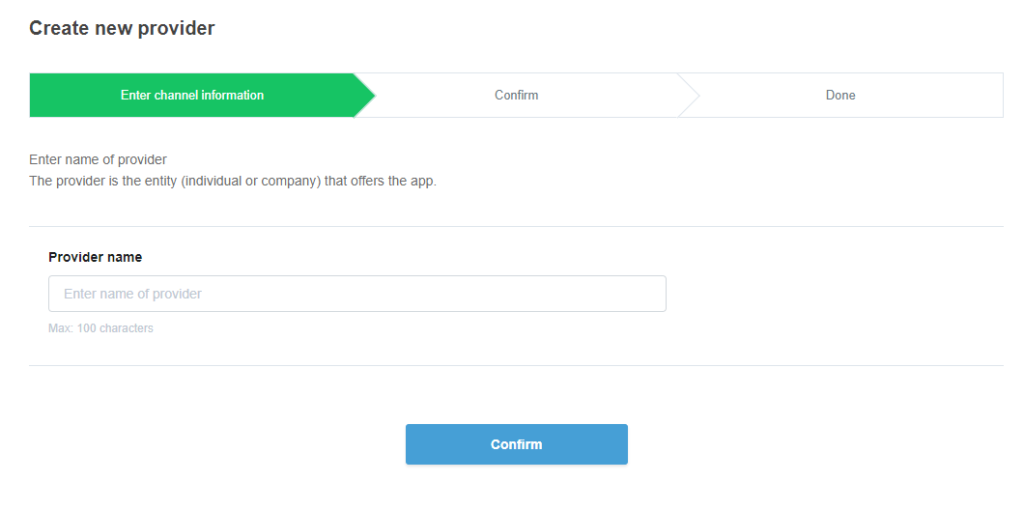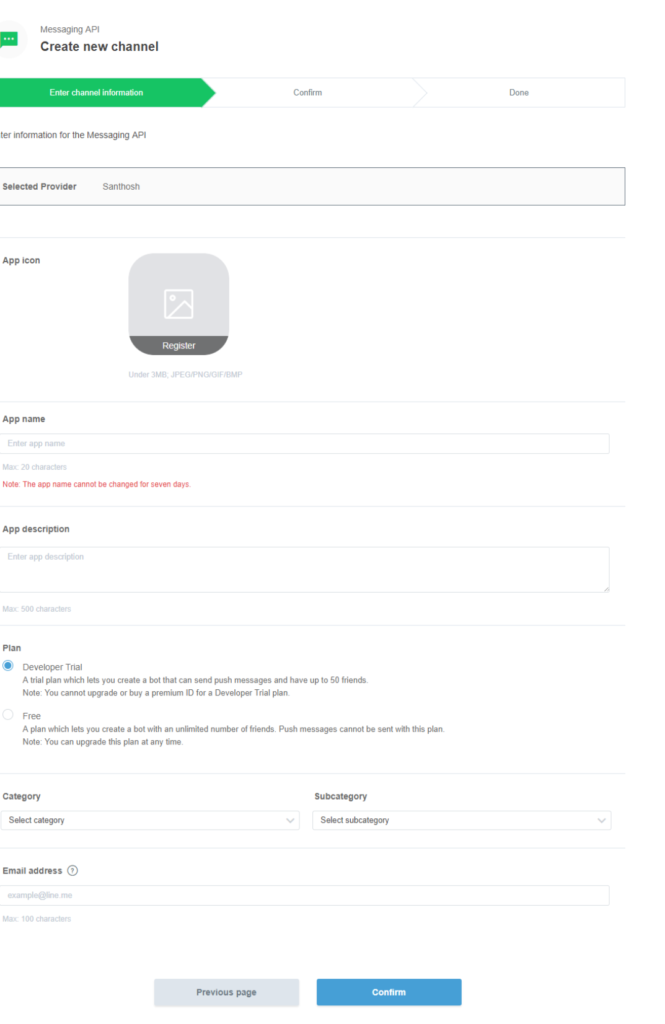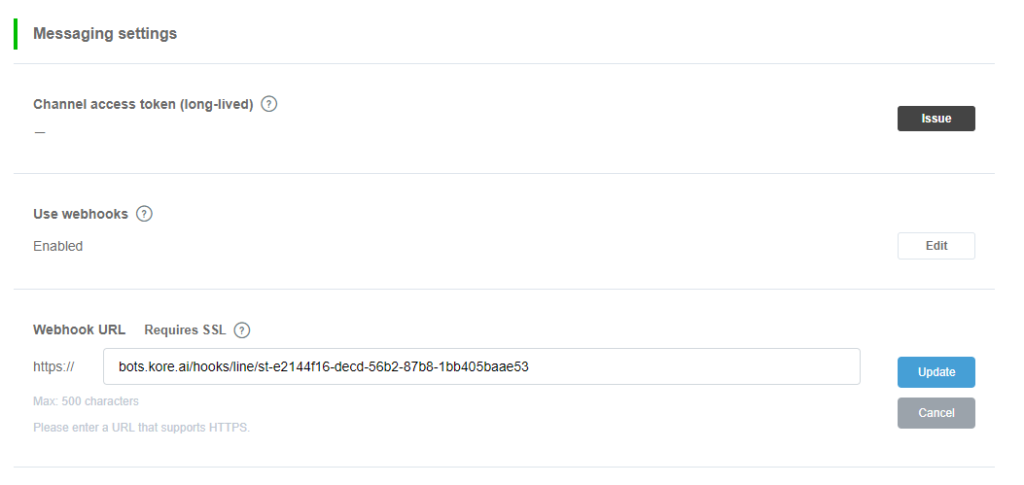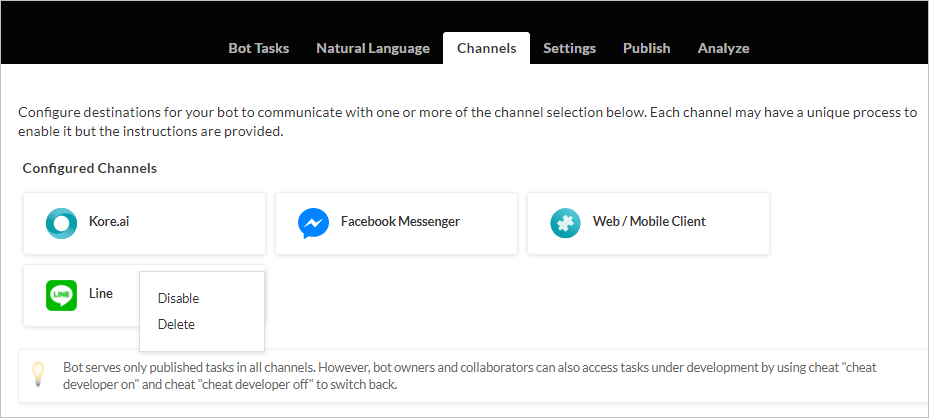To add the LINE channel to your Kore.ai bot, you must set up a webhook integration to configure the connection between LINE and Kore.ai. Adding the LINE channel to your Kore.ai bot allows end-users of your bot to interact with your bot using their LINE accounts. To add the LINE channel to your bot, you must:
- Create a Provider – To set up the LINE channel, log in to your LINE developer account to create a New Provider or select a Provider that you want to use for this bot and then add the channel. To enable the LINE channel, you must create and register for a developer account in the LINE Developers portal.
- Enter Channel Information – Enter channel information for Messaging API like App Icon, App Name, Plan, Category, subcategory, and email address.
- Setup Webhook Integration – To enable the LINE integration to your Kore.ai bot, enable webhook integration by copying the Webhook URL provided in the Configurations tab of the LINE Channel page in the bot builder.
- Enable Channel – After the integration setup and entering the configuration details in the bot builder, you must enable the channel.
Create Line Provider
- Log in to your LINE Developer account portal.
- If you already have a Provider that you want to use for this bot, then choose the provider from Provider List.
- Under the Messaging API section, click Create Channel.
- Or, if you wish to add a new provider, use the Create new provider option to create a new provider.

- Enter the Provider name and create a new provider.
- After you have created the provider, select Create Channel under the Messaging API section to continue with the addition of the channel.
Add LINE Channel
- In the Bots section of the Bot Builder, click the bot for which you want to add the LINE channel.
- On the Channels tab, click the LINE icon. The LINE Channel page is displayed.
- In the Enter channel information field, provide the required details and create the channel like App Icon, App Name, Plan, Category, Sub-category.
- Click Confirm to review and proceed with channel creation.

Note: Kore.ai platform uses PUSH_MESSAGE APIs to deliver non-interactive messages to the end-users of the bot. These scenarios include cases like alert notifications, session closure messages, and any other scenario where the replyToken from the Line channel is either not available or expired. These API calls called may be charged; review the LINE plan options and select the appropriate plan that suits your needs.
Capture Channel Details
-
- After the channel is created, you are redirected to the Provider dashboard with a list of channels available.
- Select the channel you have created above to continue with channel configurations.
- Capture the Channel ID and Channel Secret of your LINE channel and provide them in the Configurations tab of this page.
Enable Webhook Integration
- To set up webhook integration, go to Messaging Settings section and enable the Use Webhooks option.
- Copy the Webhook URL provided in the Configurations tab of the Channels page and enter in the Webhook URL field.
- Click Update.

- After saving the webhook URL, click Verify to ensure that the webhook call from LINE is acknowledged by the Kore.ai platform.
Review Additional Options
- Review additional options available for your LINE channels like group behavior, auto-replies, and greetings messages.
- Go to the Configurations tab of this page and complete the setup.
- WEBHOOK URL: Provide URL without https:// as LINE already includes that part.
- CHANNEL ID: Capture the Channel ID of your LINE channel and provide it here.
- CHANNEL SECRET: Capture Channel Secret from your LINE channel and provide it here.
Edit LINE Channel
To edit the LINE channel, follow the below steps:
- Hover over the channel and click to modify. You can make necessary updates to your channel configurations and save them.
- You can also disable or delete the channel information by clicking the Settings icon.

Select one of the following commands to modify the channel:
- Disable/Enable – Click Disable to temporarily disable the use of the LINE channel for your bot. To enable the use of the LINE channel, Click Enable.
- Delete – Click Delete. On the Delete Confirmation dialog box, click OK to permanently delete the bot channel configuration.
